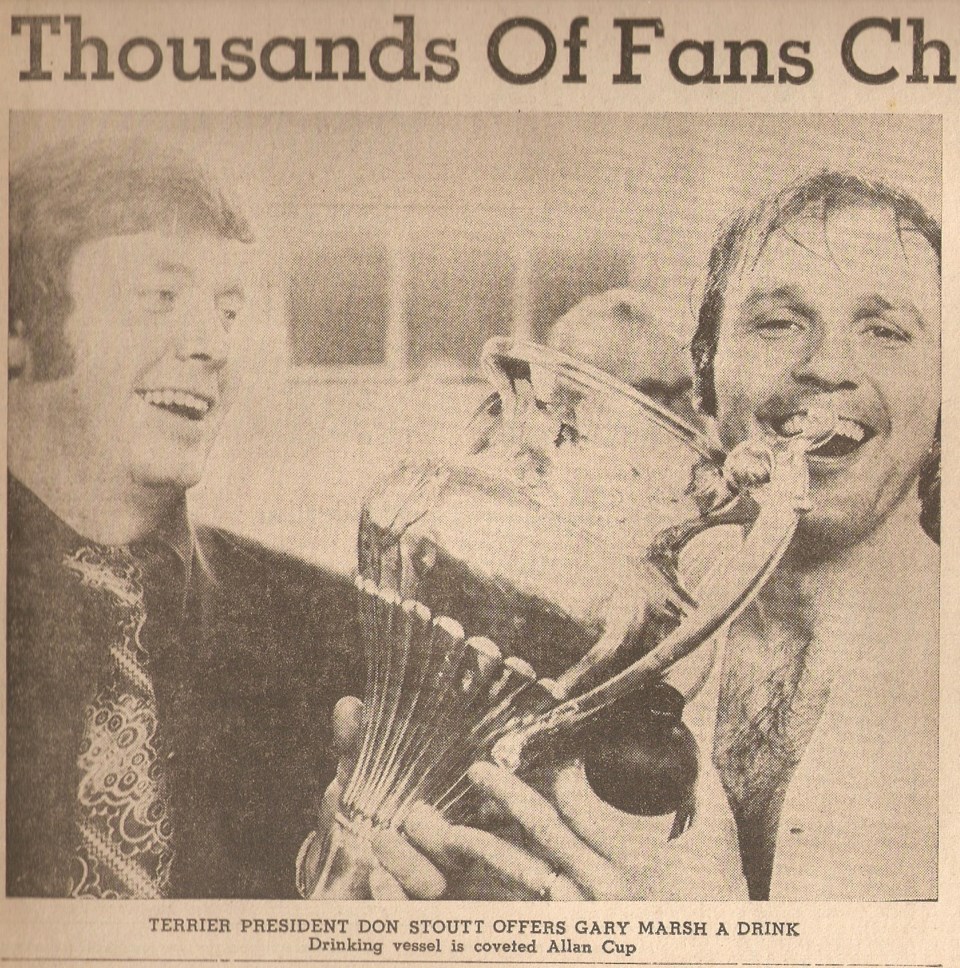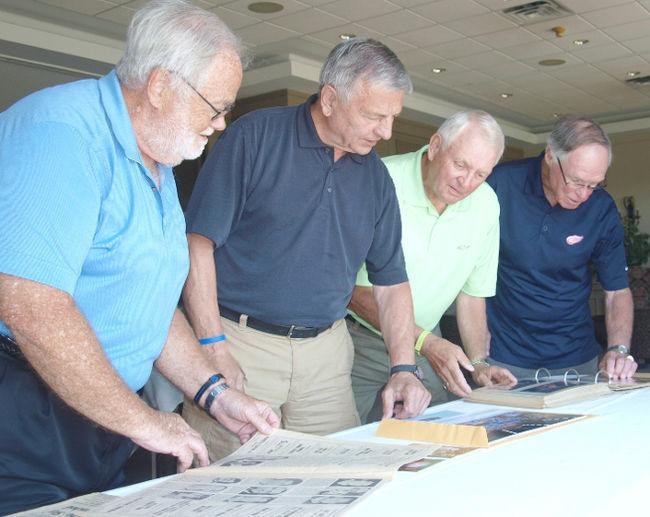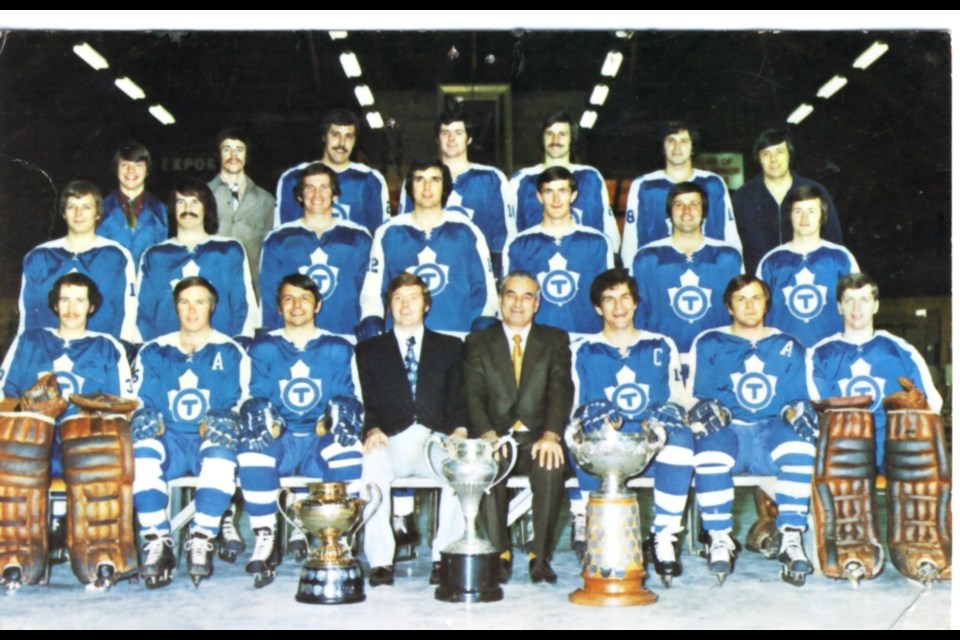On this day, 50 years ago, Orillia was in hockey heaven. And the Community Centre on Pentang Street was the centre of the universe.
In the spring of 1973, long before the internet and social media, it was the Orillia Terriers who dominated conversations at local coffee shops as they chased senior hockey’s holy grail.
It was a time when the Allan Cup was almost as coveted as the Stanley Cup, when senior hockey was but a rung below the NHL; where the calibre of play — some would say— was better than some of the NHL teams were playing.
And during that time, the Orillia Terriers were as good as anybody. And in 1973, they were better than everyone.
But that season to remember got off to a rather inauspicious start.
In September of 1972, after a mediocre start to the season, Terriers coach Joe Kane shocked his players and the team’s management by walking away from the team during a mid-week practice.
“I remember we had just played in Owen Sound and I think we were probably 4-2 or something like that,” defenceman Doug Kelcher told me several years ago.
“In the middle of practice — I remember it was a Tuesday night — Kane stops everything and says, ‘Nobody is listening to me.’ And then he looks at me and says, ‘Doug, you’re the new coach.’
“And he walked away.”
Kelcher, a high-school teacher in Toronto at the time, had no inkling of the move and no idea why Kane selected him to take the reins. But Kelcher did just that, becoming a playing coach for the Terriers.
“I remember driving home from practice with (teammate Mike) Draper and (Gary) Milroy and we all thought he would come back,” said Kelcher.
Kane did not return. And Kelcher led his team to a stellar 31-13 record as Orillia finished just behind the powerful Barrie Flyers for second place in the highly competitive Ontario Hockey Association’s Senior ‘A’ division.
While Kelcher was the coach, the team was full of veterans and leaders. He downplays his own role in the team’s somewhat surprising success.
“We didn’t fight internally like some teams did,” Kelcher said. “Tom Polanic was our captain and he was a great help, as was Tom McCarthy (now deceased). It was a great group of guys that just got along and played well together.”
In addition, the team’s braintrust was in his corner, he stressed.
“Don Stoutt was the president of the team and ran the off-ice stuff and he really isolated me from any crap that was going on,” Kelcher said. “To me, as the coach, he was great; very, very helpful.”
For the Terriers, the path to the Allan Cup would go through their perennial rivals in Barrie. In a tough playoff series for the Ontario championship, the teams were tied 2-2 in their best-of-seven series heading into pivotal Game 5 in Barrie.
“I remember we played in Barrie on Good Friday and we won Game 5 mostly thanks to (goaltender Jean-Louis) Levasseur. He was tremendous that game,” Kelcher recalled
Back at home in Game 6, the Terriers were desperate to knock off the rival Flyers in front of their rabid home fans at the Community Centre. The tight game went into overtime. The tension inside the old barn was palpable. Ironically, it was Kelcher — a stay-at-home defenceman who rarely scored — who notched the series winner in overtime.
“That was the biggest win we ever had,” Kelcher said. “Barrie was the second-best team in Canada, in my opinion, and we didn’t want to go back there for Game 7. Who knows what might have happened then? We knew if we could get by them, we’d have a chance to win the Allan Cup.”
After finally managing to beat their arch rivals, the Terriers faced a best-of-five playdown with Thunder Bay for the Eastern Canadian championship. The Terriers won the series in Thunder Bay in the fifth and deciding game.
Orillia then hosted the Allan Cup — a best-of-seven series against the St. Boniface Mohawks fro m Manitoba. After the Terriers easily won the first game 12-2, the Mohawks shocked the home side, winning Game 2 by a 6-4 score.
m Manitoba. After the Terriers easily won the first game 12-2, the Mohawks shocked the home side, winning Game 2 by a 6-4 score.
“At home, everybody expected us to win, so there was a lot of pressure on us,” Kelcher said. “After that second game, Jimmy Keon, who was injured, I think, in the first game, told us we had to get it together. He ran the bench during the rest of the Allan Cup and did a great job.”
As did the players. Once again, Levasseur stepped up his play and the Terriers went on to dominate the next three games (by a combined 27-8 score) and won Orillia's first — and only — Allan Cup.
“The atmosphere was just electric,” Kelcher recalled, describing how people crammed into the arena and found places to watch not shown on seating maps. “All of the games were sold out. I think it was a real source of pride for the city to win the Allan Cup.”
It was very meaningful to the players, he said.
“Those days in Orillia were among the greatest days of our lives,” said Kelcher, who remains friends with many of those teammates who celebrated with tears and champagne in the Community Centre that memorable night of May 13, 1973. “The town was really behind us. It was a great place to play.”
Among the crowd that night was Bill Watters, an Orillia native who was, at the time, a star football player for the University of Toronto. He followed his hometown team through regular updates from his mom. When he learned they had a chance to win the title on home ice, he made sure to be there.
That night, it seemed all of Orillia was there along with NHL superstars Bobby Orr and Dave Keon, whose brother, Jim, played for the Terriers.
"Bobby Orr, the greatest player to ever play, in my estimation, was sitting beside me and Keon, one of the greatest Leafs of all time, (was) in Orillia to watch the Terriers win the Allan Cup," recalled Watters. "To win an Allan Cup is something all Orillians were proud of and remain proud of."
It was also one of the true hockey highlights for Claire Alexander, who would go on to play for the Leafs.
But back then, Alexander was widely known as the "milkman" for delivering milk to 192 households on his daily route while he played in Orillia.

Ken "Jiggs" McDonald, a NHL Hall of Fame broadcaster who got his start at CFOR in Orillia, said Alexander cherished his time in Orillia.
"No matter where he played, he always had Orillia in his heart," McDonald said at a Terriers reunion several years ago.
It was obvious at that reunion what Orillia meant to the players.
“I've often said that, as players, you never get an opportunity to thank people," Alexander said, noting the Terriers quickly went their separate ways after winning the Allan Cup. "This is my chance to say thank you to the school teachers, to the police officers, to my family
“You all mean so much to me. Without you, we are not what we are. I thank you from the bottom of my heart. Orillia will be in my heart until I leave this earth, I promise you."
And for those who grew up in Orillia during those halcyon days, those players and that memorable run will be something they will never forget.
The Allan Cup champs included John Louis Levasseur, Mike Draper, Doug Kelcher (coach), Tom Polanic, Grant Moore, John McWilliams, Gary Milroy, Jim Keon, Ron Clarke, Jim O’Brien, Clare Alexander, Gary Marsh, Ernie Miller, Ray Dupont, Garrie Vaughan, George Vail, Charlie Cipolla and Henry Monteith.
Don Stoutt was team president, while Al Beausoleil was the team's manager. Peter Leman was the team's trainer, while Billy Harris was the assistant trainer.



